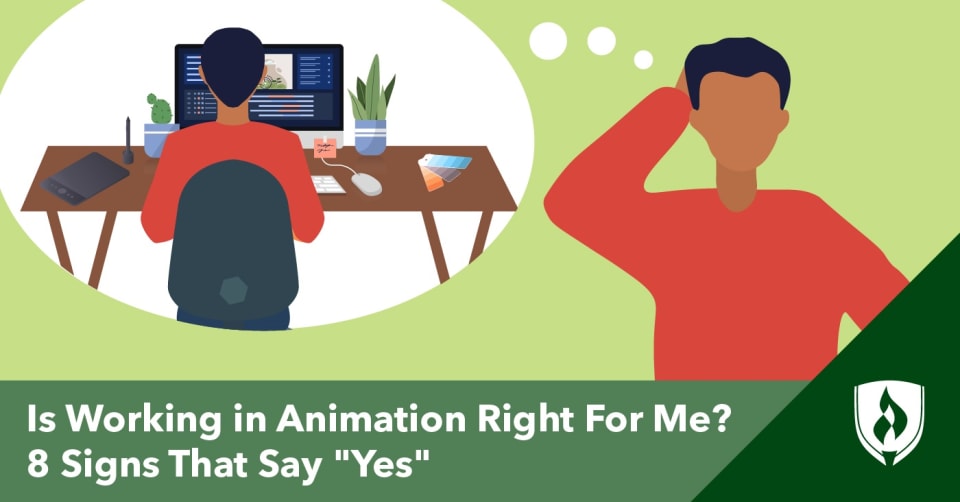
Animation is certainly an appealing field to anyone who loves to draw or illustrate. If you’ve spent hours and hours working on sketches or analyzing what makes your favorite shows so special—you’ve probably heard people say, “Wow, have you considered going into animation?”
But there’s a difference between being passionate about animation and being suited for the job. This industry is both creative and technical, and it requires a unique blend of abilities. Before you commit to a path of training or formal education, it’s helpful to know you’re pursuing a profession that suits your personality and natural characteristics.
And even beyond aptitude, you have other career needs to consider. What does this career path look like? Will you even like working in animation? Would working in animation match your long-term needs for a career?
To answer some of these questions, you need to get a closer look at animation careers from within. We asked animators from all over to give a little preview of what working in animation is really like.
What is working in animation like?
The end product of an animator’s work can be breathtaking. If you are interested in this field at all, you probably appreciate just how powerful amazing animation can be—but what did the process of making it look like?
What is it like to work in this role day-to-day?
People may certainly picture film and video game companies when they hear the term “animation.” But an animator can also work on projects focused on marketing, branding, education, software development and so much more. The differences in these environments can certainly influence how animators approach their work, but all are likely to be much more structured than what the average Joe imagines.
“Many people have this fluffy idea of creativity; sitting around on a bean bag waiting for an idea to pop into your head,” says Stephen Pope, CEO & founder of Instinct Animations. But the process of creativity is much more driven than that, Pope explains.
Another easily overlooked aspect of working in animation is that you’re often sharing the process with other people. Animators, like many other creative professionals, will often work on teams of people to brainstorm, problem solve and execute the work.
“For me, the most challenging aspect of working in animation is also the most fun aspect—collaboration,” says Sabine Heller, global head of character animation and rigging at Mikros Animation®.
Heller explains that having many different personalities and people with different focuses working together as one team is a big part of the role. “It can be very challenging, but also extremely rewarding as it fosters an environment that allows for diverse perspectives and fresh ideas.”
Like other deadline-driven creative careers, the work of an animator has ebbs and flows—and long hours may be required when crunch time hits. While perhaps not a dealbreaker, you should be aware of this if you’d prefer to keep a more traditional work schedule.
Is working in animation right for you?
If animation sounds appealing so far, that’s a great sign! But if you are still wondering if animation is the right choice for you, it might help to get a better idea of the skills, traits and qualities that help animators thrive. Anyone can practice and get stronger in their weaker areas, but there’s no denying that a little natural proclivity for the job will make your path into animation more enjoyable.
Working in animation might be a good choice for you if…
1. You’re naturally curious
Lots of people spend their days fighting boredom and just rolling forward with the circumstances and scenery in their lives. But that’s not you. When you are at your best, you can find a way to be interested in almost anything. The list of your hobbies—or the list of hobbies you wish you had time for—is a long one, and when you learn about something new, a spark of excitement lights up in your mind.
“The best animators are curious,” says William Gadea, creative director and founder of IdeaRocket®. Whether it presents itself in your job through the actual content you’re inspired to create or in a less-direct way, curiosity will serve you well in a career as an animator. Gadea adds that if you are bored by what you are doing, it’s going to show. Curiosity keeps boredom at bay and provides ample opportunities for finding inspiration.
2. You have a purposeful, artistic eye
Maybe you were the kid who doodled elaborate pictures and stories on the side of your math homework, or you were always drawn to artistic disciplines and hobbies. Good design catches your eye, and that penchant for knowing what’s aesthetically pleasing goes a long way in animation.
“An animator should be an artistic person,” says Anastasia Vasilieva, animator and designer for Animatron. Vasilieva says animators need sophisticated design ability paired with close attention to detail and a love for narrative.
Storytelling ability should not be overlooked—a good-looking design brought to life with animation is great, but it’s even better when it is done to communicate something.
3. You pursue feedback
Do you believe in the value another person’s perspective can bring to your creative projects? Are you eager to hone and improve your creative work as much as possible? Successful animators aren’t afraid to put their work in front of a critical eye.
“The most important thing I do is to ask for feedback,” Heller says. “Working in a bubble will only get you so far. Asking for and giving feedback is what will shoot you and your work over the top.”
4. You are analytical
When you are making a decision or solving a problem, do you use rationale to come to your conclusions? Are you curious about how things work? Analytical thinking is so often associated with the sciences, but it’s an important part of animation as well.
“An animator should have an analytical mind,” Vasilieva says. “Animation includes software knowledge to create various animation artwork with desktop and online tools. And it also requires curiosity and constant observations to understand how things work and move to express this knowledge in animation.”
Since the art of animation is drenched in the digital world, technology is a huge part of the job. Understanding the building blocks of technology—and science—generally comes in handy.
“Even if animated objects move in an exaggerated way, they still follow the laws of physics,” Vasilieva says.
5. You’re focused on the subject at hand
Maybe you can lose yourself for hours in a drawing or a book. Or maybe you find yourself following a fascinating topic on Twitter without missing a thing. No matter what it is, if something catches your interest, you can lock in and give it your full attention.
In animation, this is a vital skill. The overall process of creating a series of images that move seamlessly takes a lot longer than most could even fathom. Gadea says the ability to concentrate for a long period of time is key in animation. If you struggle to stay focused even on projects you enjoy, this will likely be a barrier.
“As animation requires much effort, lack of diligence and attention would be the main obstacles to succeeding,” Vasilieva says. While you may be intimidated by the idea of that much careful, technical work, most animators find it rewarding to see what they spent hours drawing come to life.
6. You have a good sense of humor
Do you love to joke around with the people in your life? Do you appreciate comedy and the subtle motions and gestures that push jokes over the top? If you do, bring that sense of humor along in your animation career.
Animation is often associated with humor in a very direct way, according to Vasilieva. When you think of it, you probably picture cartoons. “Emotional empathy with a good sense of humor would really help a person to create engaging and appealing animations,” she says. Animators have an excellent sense of body language, expression and gestures—and often the funniest people know how to exaggerate these visual cues for added effect.
“The sense of humor is another way of expressing creativity,” says Tigran Manukyan, CCO of RenderForest. Even beyond the animation itself, Manukyan says it’s much easier to work with people who have a good sense of humor and some spontaneity. For situations where you will work with a team of people, your sense of humor can add to the group chemistry.
7. You like to make something distinct
It goes without saying that animators need to understand the most essential principles of design and the rules of animation, Pope says. Yet, knowing when and how to break those rules really sets the best animators apart. “The best animators bring their own personal touch to make animations feel organic and dynamic; but most importantly, they think outside the box to create visual metaphors that are out of the ordinary.”
8. You are passionate
You never could tolerate putting your name on a sloppy piece of art or a half-hearted project. When you think of design or animation, you feel excited to get going, an itch in your fingers to bring an idea to life. No matter what other traits you have or don’t have, passion for the job is what truly makes or breaks an animator.
“The most important trait by far is passion,” Gadea says. “If you’re obsessed with making good animation, you will get better, because you will always come back to the computer, model or piece of paper.” Passion will make you keep trying and practicing. Passion will keep you at your work, making it as stunning as possible.
“If you don’t have the passion, it’s going to be hard to get the practice needed to make yourself highly employable,” Gadea says. Though you might have to hustle against many different animators at the beginning of your career, time will likely eliminate those not passionate about the craft. But if you love animating, there are ways to stand out right away.
Gadea advises students to make their own films and put them up in a portfolio. “By becoming better acquainted with the entire animation pipeline, you will perform your narrower task set better. When I see personal films on a site, it tells me that animator has a passion for their art.”
What moves you?
If you find that the characteristics described above resonate with you, you may be destined for work in animation. The good news is, even if some of these don’t quite fit you, it doesn’t mean your dreams of an animation career are ruined.
“In terms of talent, it’s a mistake to think that you have to have it all,” Gadea says. “I can’t draw, and I’m not a great designer either, but I’ve got pretty good timing, and I’m a good storyteller, so I’ve been able to contribute to teams that way.”
Animation might be the perfect career to let you leverage some of your natural qualities in a creative career you can enjoy. But it certainly isn’t the only creative career out there. If you are on the fence about animation—or if you just want to make sure pursuing animation wouldn’t mean cutting off other career options—check out 10 Types of Design Jobs for Creative People. Additionally, check out some in-demand animation skills you need to make design come to life.
Related Articles:
RenderForest is a registered trademark of Renderforest LLC.
IdeaRocket is a registered trademark of IdeaRocket LLC.
Mikros Animation is a registered trademark of Mikros Image SAS.




